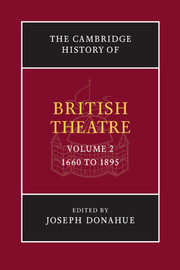Book contents
- Frontmatter
- Part I 1660 to 1800
- Part II 1800 to 1895
- 11 Introduction: the theatre from 1800 to 1895
- 12 Presence, personality and physicality: actors and their repertoires, 1776–1895
- 13 Theatres, their architecture and their audiences
- 14 Stage design from Loutherbourg to Poel
- 15 Theatre and mid-Victorian society, 1851–1870
- 16 Gendering Victorian theatre
- 17 Popular entertainment, 1776–1895
- 18 The Bells: a case study A ‘bare-ribbed skeleton’ in a chest
- 19 The new drama and the old theatre
- 20 1895 A critical year in perspective
- Bibliography
- Index
- References
17 - Popular entertainment, 1776–1895
from Part II - 1800 to 1895
Published online by Cambridge University Press: 28 March 2008
- Frontmatter
- Part I 1660 to 1800
- Part II 1800 to 1895
- 11 Introduction: the theatre from 1800 to 1895
- 12 Presence, personality and physicality: actors and their repertoires, 1776–1895
- 13 Theatres, their architecture and their audiences
- 14 Stage design from Loutherbourg to Poel
- 15 Theatre and mid-Victorian society, 1851–1870
- 16 Gendering Victorian theatre
- 17 Popular entertainment, 1776–1895
- 18 The Bells: a case study A ‘bare-ribbed skeleton’ in a chest
- 19 The new drama and the old theatre
- 20 1895 A critical year in perspective
- Bibliography
- Index
- References
Summary
‘Popular entertainment’ is used in this chapter as a convenient label for the music hall, circus, fairground amusements and other performance-centred spectacles which, while often overlapping and cross-fertilizing with the ‘legitimate theatre’, essentially ran parallel to it and were broadly distinguishable as separate entities by contemporary observers. The chapter is concerned with the growth, increasing specialization and impact of commercial amusements in general and the music hall, the most dynamic and influential element of the nineteenth-century popular stage, in particular. It begins, however, with two cautionary notes.
The focus on commercial entertainment results only from spatial constraint. Particularly from about 1850 and most noticeably in smaller towns and villages, Britain possessed a rich and dense amateur cultural life enabling thousands of performers from a wide variety of social backgrounds to amuse their communities in settings from parlour to concert hall. This cultural voluntarism vastly increased the opportunities available to contemporary audiences and indeed, for some genres, provided the major source of supply. Notwithstanding the efforts of D’Oyly Carte, Gilbert and Sullivan operetta owed much of its popularity to amateur performance, as in Hanley, Staffordshire, where a series of amateur productions attracted 15,000 people during a six-day run in 1896. Amateur activities also produced ‘casual labour’ for the professional stage, as exemplified by the use of children in pantomime-ballets and spectacles, and acted as a training ground for future professionals and the thousands of semi-professionals so crucial to the entertainment industry; Harry Lauder was only the best-known music hall star to receive a stage education in amateur concert parties.
- Type
- Chapter
- Information
- The Cambridge History of British Theatre , pp. 369 - 387Publisher: Cambridge University PressPrint publication year: 2004
References
- 2
- Cited by



